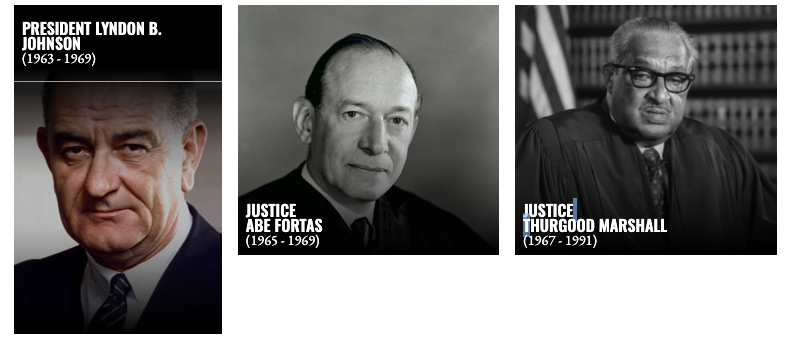The Volokh Conspiracy
Mostly law professors | Sometimes contrarian | Often libertarian | Always independent
Today in Supreme Court History: November 22, 1963
11/22/1963: President Lyndon B. Johnson takes the oath of office. He would appoint two Justices to the Supreme Court: Abe Fortas and Thurgood Marshall.

Editor's Note: We invite comments and request that they be civil and on-topic. We do not moderate or assume any responsibility for comments, which are owned by the readers who post them. Comments do not represent the views of Reason.com or Reason Foundation. We reserve the right to delete any comment for any reason at any time. Comments may only be edited within 5 minutes of posting. Report abuses.
Please to post comments


Brasfield v. United States, 272 U.S. 448 (decided November 22, 1926): judge can’t ask a jury foreman during deliberations where the vote currently stood (even though he doesn’t ask which side is winning); conviction for violation of Volstead Act (transporting alcohol) reversed
Mississippi v. Tennessee, 142 S.Ct. 31 (decided November 22, 2021): in original jurisdiction case, upholds Special Master’s finding; though Tennessee owns all the water under it, it is equitably liable to Mississippi for pumping that depletes downstream state aquifers (supplying water for Memphis reduced groundwater pressure in northern Mississippi)
Re: Mississippi v. Tennessee
Facts of the case
The State of Mississippi sued the State of Tennessee in 2014, alleging that Tennessee was taking Mississippi’s groundwater by allowing a Tennessee utility company to pump large amounts of groundwater from the Middle Claiborne Aquifer, which is located at the Mississippi-Tennessee border. Mississippi argues that the groundwater stored in the aquifer lies entirely within Mississippi and would never flow into Tennessee if it were not for the pumping. Mississippi expressly disclaims any equitable apportionment remedy, arguing that the principle does not apply to this dispute. Instead it seeks only damages and related relief. The Special Master recommended that the Court dismiss the complaint but grant Mississippi leave to amend its complaint to seek equitable apportionment.
Question
Is Mississippi entitled to damages, injunctive, and other equitable relief for the groundwater taken by Tennessee?
Conclusion (Unanimous for Tennessee)
Mississippi is entitled only to the remedy of equitable apportionment, and since its complaint expressly disclaimed equitable apportionment, ITS COMPLAINT IS DISMISSED WITHOUT LEAVE TO AMEND (emphasis added). Chief Justice John Roberts authored the unanimous opinion of the Court.
Equitable apportionment is a judicial remedy that seeks to fairly allocate a shared water resource between two or more states. Although the Court has not previously considered whether the doctrine of equitable apportionment applies to interstate aquifers, it has applied the remedy when transboundary water resources were at issue, and the same reasoning applies. First, like other transboundary water resources, the Middle Claiborne Aquifer has a “multistate character.” Second, it contains water that naturally flows between the states. And third, actions taken in Tennessee affect the portion of the aquifer that underlies Mississippi. For these reasons, equitable apportionment applies to the waters of the Middle Claiborne Aquifer. (oyez)
So according to Oyez, Tennessee was not equitably liable to Mississippi.
Thanks. Will rephrase.
Unclear why Mississippi took that position. Though the case is precedent for the idea of equitable apportionment as to aquifers.
I understand now. That's a good precedent.